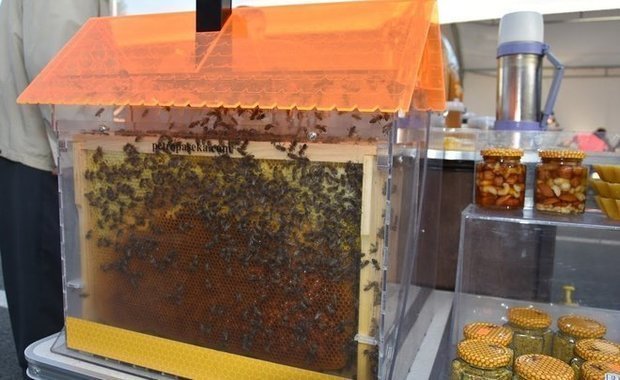Number of apiaries with bees of Tatar population to increase in Tatarstan
A programme of assistance to breeding bee farms is being launched in the republic
Tatarstan plans to develop the Tatar bee population — they include a special breed of honeybees, which is highly valued by beekeepers of the Volga Region, Urals, and Siberia for its unique properties. However, in recent years, there has been a threat of disappearance of the Tatar bee, therefore, to increase its number in the republic, a programme of assistance to breeding bee farms is being launched. Another problem is the treatment of fields with pesticides, and in the republic is trying to find a solution that would suit both agronomists and beekeepers. What is the difference between Tatar bees from the rest, whether the notification system will protect against the death of insects, and how many chemicals beekeepers use in their work — read the details in the material of Realnoe Vremya.
“Things are resolved among themselves”
Beekeeper from Pestrechinsky district Almaz Davlyatshin has been engaged in beekeeping for 4 years. Now there are 14 beehives in his apiary. There is an apple orchard near the apiary, acacia thickets and numerous fields, the main activity of the farm is crop production.
“I started doing bees just for the soul. Besides, we've recently made an apimodule. We do not sell our honey, we keep an apiary for ourselves, friends and relatives. I think honey is the best gift. It would be possible to go to fairs, but we do not have enough volume for this," the beekeeper said.
Almaz Davlyatshin called the death of bees due to chemicals, the use of harmful drugs in the care of bees themselves and the importation of insects infected with diseases from southern countries the main problems of the industry. According to the beekeeper, there were cases of bee poisoning last year in the Pestrechinsky district, but not one of them did not reach court.
“I think such cases are often resolved among themselves behind the scenes. The proceedings are very complex and costly for the beekeeper — you need to take samples, do tests and so on. Not everyone wants to spend their time and money on this," the man explained.
“There are no guarantees that this will not happen again”
Cases of bee poisoning due to spraying of flowering fields with chemicals are recorded annually. For this reason, amendments have been made to the federal law on beekeeping, according to which farmers are required to notify beekeepers about treatment with chemicals 3 days in advance.

But there are no guarantees even in this case, the specialist admitted, explaining this by the human factor. In his opinion, if the relationship between farmers and beekeepers is built, then the probability that bees will not die may be 99%.
“We are tasked to take a number of measures for the new season aimed at relieving social tension between beekeepers and agronomists, because they often do not understand each other," he admitted.
According to the representative of the Ministry of Agriculture, there are now many more farms in the republic that successfully cultivate rapeseed and do not harm bees:
“In December 2022, we conducted the first training in Russia on the topic of safe cultivation of crops. We proposed various options, including the use of biological drugs, which we actively develop, this may become one of the alternative solutions to the problem. We also showed farms that cultivate rapeseed using chemicals, but due to that the technology is followed, the death of bees is completely excluded here. And the third option is to reduce the use of fertilisers and chemicals to a minimum. Since January, we have started holding meetings on this topic in every district. In total, about 40 such meetings have been organised, where 1,500 people took part.”
Now farmers have already begun to spray the fields, as Gamirov assured, the warning system is fully respected in all districts.
“Notification is meaningless”
At the same time, some beekeepers are skeptical about this system. One of them is a well-known beekeeper of the republic Firdinat Vafin from the Tetyushsky district. He has about 200 beehives in two apiaries — one is in the village, the other is inside the forest. His forest honey underwent pollen analysis in Moscow, which showed the content of lime honey at the level of 99,5%.
“We have not had a single case of bees dying due to spraying chemicals. In our farm in the Tetyushsky district, there is Nur agricultural firm. This is a powerful, advanced, and exemplary farm. Now it is impossible to get a good harvest without the use of pesticides. But our agricultural producers invariably work according to all norms and rules. If they are observed — to work at night in calm weather, in compliance with the dosage, then this does not affect us in any way," the beekeeper said.
In the notification system, when farms are required to report on the treatment of fields in 3 days, Firdinat Vafin does not see any effectiveness.
“How can this help? For example, I am informed that the fields are planned to be treated with pesticides. And what should I do? Where should I put my 200 hives? This is not a cow that you can just close in a corral and not let go. Notification is meaningless. Even if it is possible to close the hives, it will take me 2-3 days. This is a very difficult job. If you close the bees incorrectly, they can die there from the heat. And what should we do with those bees and other insects and animals that live in nature? Let them die? Who will hide them? I think that the only and global way out of this situation is to use environmentally friendly drugs," the man expressed his opinion.
“There has become more respect for beekeepers”
One of the few facts of the mass death of bees from chemicals, which reached the court, occurred last year in the Arsky district. As Alexey Andreev, the deputy chairman of Beekeepers of Tatarstan regional public organisation, chairman of the Tatarstan branch of the Union of Beekeepers of Russia, told us, the fourth meeting on this case has been held. It was postponed several times. The next hearing is scheduled for May 21.
“We are now writing an appeal to the prosecutor's office to prohibit the treatment of chemicals of the first and second class within a radius of 5 kilometres from settlements. What is the problem: I am on my own land. Some farmer comes and declares: “I'm going to treat the fields with first-class chemicals, so take your bees away.” The question arises why I have to take the bees away if it occurred to him to spray. If a drug of the 1st class is used, then the bees must be isolated for 5-6 days or taken away for this period. It is unclear at whose expense the beekeeper should do this, who should bear the transportation costs. We want to clarify these nuances. Therefore, our association has made an appeal to the prosecutor's office about this. Since the observance of the rights of one person should not violate the rights of another person," Andreev believes.
The problem of using chemicals exists not only on the part of farmers, but also on the part of beekeepers themselves. According to Firdinat Vafin, 90% of his colleagues in the republic use harmful drugs in their work: they treat hives and bees themselves from pests.
“It is impossible not to use drugs at all when caring for bees, they will die. But you need to understand that a beekeeper can choose what to work with — organic or chemical substances. Abroad, in the case of the use of certain types of harmful drugs, the use of honey in food is prohibited. But we have such drugs on free sale. You can go to any store for beekeepers, buy them there freely or order them through online platforms and then use them. This is a very big problem," admitted Vafin.
The beekeeper complained that now there is no full-fledged laboratory in Russia that could comprehensively check the quality of honey, make a full analysis of the product.
Subsidies to support beekeepers
The season of buying bee colonies has been open since the beginning of May. Since April 28, Tatarstan has a restriction on the import of bee packages* from Uzbekistan. The restrictions have been introduced by Rosselkhoznadzor. The reason was systematic violations during the shipment of these products to Russia.
When delivering bee packages from Uzbekistan, experts recorded cases when the cargo did not reach the place indicated in the importer's documents and turned out to be in illegal circulation in Russia. “Failure to comply with the veterinary requirements of the Russian Federation and the Eurasian Economic Union poses a threat of introduction into Russia and the spread of particularly dangerous diseases for bees on its territory, which may negatively affect the development of beekeeping in the country and the export potential of the state," Rosselkhoznadzor warned.

Now there are three breeding farms in the republic — one in Sabinsky district, two in Baltasinsky. In the near future, another one will start working — in Tyulyachinsky.
The Tatar bee population originally lived in our area and is more adapted to our conditions both in terms of honey collection and in terms of wintering, Gamirov said.
The state provides subsidies to breeding farms and beekeepers to support the Tatar bee population. Farms are refunded 50% of the cost of the bee package. If a beekeeper buys bees from a breeding farm, he is given a 50% discount, which is subsequently returned to the seller.
*A bee package is a set formed for sale, which includes a uterus, a certain number of bees and the necessary resource for harvesting commercial honey.